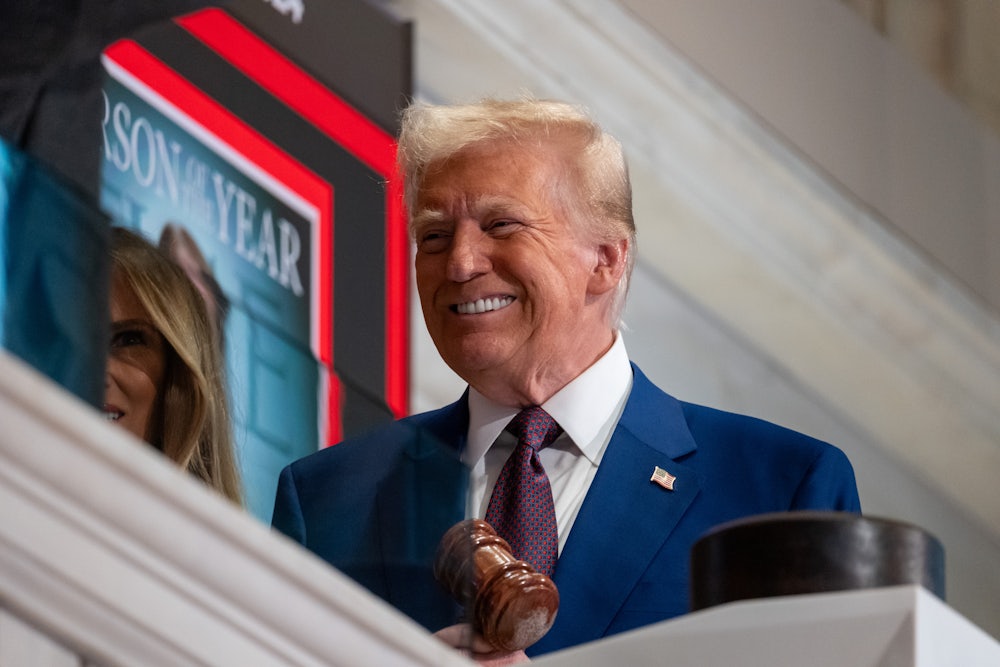President Donald Trump’s stupidity, incompetence, and self-delusion—all of which were on full display this past week, as he single-handedly pushed the country toward economic ruin—are so profound as to make everyone else in the corridors of power, even House Republicans, look downright masterful. But the stock market’s attendant seesawing is a reminder that the bigwigs on Wall Street also have absolutely no clue what they’re doing.
Politically, and to a lesser degree economically, America has just endured one of the most insane weeks of one of the most insane decades in its history. Last Wednesday, a.k.a. “Liberation Day,” Trump announced a trade war against the entire world. The stock market cratered, shedding $10 trillion in just three days. A recession seemed inevitable; a global depression loomed. And then, as quickly as Trump launched the war, he retreated: On Wednesday, as the new tariffs took effect, he announced he was suspending the most severe “reciprocal” tariffs for 90 days. The stock market promptly shot back up.
All of the evidence suggests that the country’s economic picture is bleaker now than it was before the market crashed. Sure, Wednesday was Wall Street’s best day in more than 17 years—but that only sounds good until you realize the last rally to exceed it was in October 2008, amid the market fluctuations of the financial crisis. And Trump is still very serious about tariffs: His across-the-board 10 percent tariffs on all countries remain in effect, as do some of the tariffs on Canada and Mexico, and he has increased tariffs on China to an unfathomable 145 percent. It’s also likely that his weeklong saber-rattling has permanently damaged the country’s relationship with key trading partners, which will have untold economic consequences. None of this is hard to understand—but it’s barely reflected in a stock market that increasingly rewards stupidity.
The market’s crash and rebound were both the result of widespread delusion. Trump had promised on the campaign trail, and reiterated after taking office, that he would impose crushing tariffs on other countries, including U.S. allies. Yet the financial industry has consistently deluded itself into believing Trump would never do such a thing, and then it acts utterly shocked when the president keeps his promise—first with his tariffs on China, Mexico, and Canada and then with his broader tariffs. Trump states his plans, Wall Street largely shrugs, and then when the tariffs take effect, the markets plunge. When Trump backtracks with a “pause,” the markets snap back—based on the delusion that Trump won’t ultimately impose such damaging tariffs.
Anticipating this chaos should have been easy. If you sell stocks or work on Wall Street, identifying things that will cause the market to go up or down is a core aspect of your job. Many of these things are minute or wonky, like earnings reports, but some are glaringly obvious. And there is no one in America who is more obvious than Trump.
He may be a political opportunist with a general disinterest in the mechanics of policy and governance, but if you spend even a small amount of time listening to Trump, or know his long history of spouting off on politics, you know he does have a few long-standing core beliefs. One is that immigrants ruin America. Another is that Black people are criminals. And a third is that tariffs are beautiful. For decades, first as a private citizen and then as a politician, Trump has consistently and enthusiastically touted tariffs as an economic cure-all that will revitalize the many towns and cities that have never recovered from America’s transition to a postindustrial economy, making the country unimaginably rich—and without anyone having to pay taxes.
Maybe our hypothetical trader isn’t really into research and doesn’t really care about what Trump said about tariffs when Ronald Reagan was president—or even what he said on the campaign trail, or in his inauguration speech (“Instead of taxing our citizens to enrich other countries, we will tariff and tax foreign countries to enrich our citizens”). This trader lives for the volatility of the moment and only really cares about what’s coming down the pike right now. And maybe, if he’s fast enough on the draw, he can make those trades quickly enough to capitalize on the gains made by everyone else who is buying the upswing from Trump’s latest reversal.
It’s possible, of course, that Trump’s latest tariffs would have triggered a sell-off, albeit a more gradual one, even if they had been anticipated. But Wall Street—where the job is literally to assess risk—was particularly blindsided, so much so that Bill Ackman, a billionaire hedge fund manager and one of Trump’s most prominent online defenders, apologized for misjudging the president. I “assumed economic rationality would be paramount,” he tweeted in a post that warned of a coming “economic nuclear winter.” Has he paid even the slightest attention to Trump’s statements about tariffs? Has he listened to Trump’s economic team defend those tariffs? There is no “economic rationality” to speak of. These people are morons. And so, it seems, are the denizens of Wall Street.
The economic picture has improved somewhat, but don’t look at your 401(k) just yet: The Dow Jones Industrial Average is down nearly 7 percent this year, the S&P 500 more than 10 percent. And there is absolutely no reason to believe that the larger economic situation has changed.
We have not reverted to a world before the president attempted to blow up the global trade system. For one thing, the blanket 10 percent tariffs on goods coming from overseas are still in effect, a substantial figure by global standards that still marks a significant increase to most pre-“Liberation Day” tariffs. Several nations, many of which have been close economic partners, have concluded that the U.S. can no longer fulfill its long-standing role as the pillar of the global financial system. In Canada, for instance, the prime minister is essentially calling for other nations to build an international trading system that disempowers, or perhaps even excludes, its southern neighbor.
We are also still very much in a potentially catastrophic trade war with China, our third-largest trading partner (after Mexico and Canada) and the one with which we have the largest trade deficit, by a wide margin. China, which suddenly looks like a stable superpower in comparison, holds billions of dollars in American bonds and trillions of American debt, giving it significant leverage against Trump, who has … these tariffs, which are only certain to accomplish one thing: increasing costs on American families and businesses alike, increasing the very immiseration that Trump claims tariffs will eradicate. (Perhaps that’s why the market plummeted again on Thursday: The reality is once again dawning belatedly on investors.)
Trump may have engaged in a tactical retreat on tariffs, but it would be foolish to conclude that his thinking has shifted. There’s no reason to be confident that the tariffs won’t kick in 90 days from now, and we can be sure that this interim period will fuel yet more economic chaos. The odds of a recession this year are still above 50 percent. Our allies are still pissed at us. China looks more powerful than ever. But on Wall Street, all that mattered was that a very bad situation had briefly improved—and that, for the first time in days, there was money to be made.






